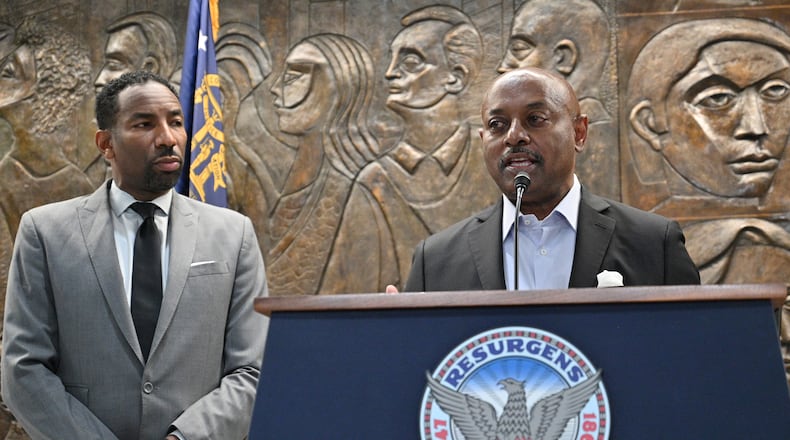Luxury home developments have outpaced low-to-moderate-income housing construction for a decade. But Atlanta’s low-income housing agency is ready to start putting shovels into the dirt for several future projects — including the long-delayed redevelopment of the Atlanta Civic Center.
Atlanta Housing Authority President and CEO Eugene Jones Jr. says the AHA supports over 27,000 low-income households, benefiting about 45,000 people. He said 97% of those homes shelter low-income families, the vast majority of which make less than $30,000 a year.
But more needs to be done, he said.
“Our job at Atlanta Housing is to recognize the affordable housing crisis our city faces and put projects in the pipeline to address that crisis,” Jones said. “And that’s exactly what we’re doing.”
The Atlanta Regional Commission says the city’s affordable housing supply is not keeping up with the region’s population growth. And an ARC study revealed in March that metro Atlanta lost nearly 60,000 units renting for less than $1,250 per month over a five-year span before the pandemic hit.
Nearly half of Atlanta’s neighborhoods experienced rapid increases in housing costs from 2000 to 2017 due to the development boom, according to the Urban Displacement Project. The Federal Reserve Bank of Atlanta reports Atlanta housing is unaffordable, and the Atlanta Realtors Association says the city’s median home price rose to $430,000 in May.
The AHA says the Republic Family of Companies, The Michaels Organization and Sophy Capital will invest $575 million into the Atlanta Civic Center site to build 1,311 apartments, a new school, offices, retail, hospitality, and cultural spaces over a decade.
Credit: Atlanta Housing Authority
Credit: Atlanta Housing Authority
Construction will begin next year if the agreement is signed within six to nine months, according to housing authority officials. The agency would recover its $41.7 million property acquisition cost over a 99-year ground lease.
“The vision for this development has the potential to infuse $1 billion into the Historic Old Fourth Ward, providing thousands of Atlantans from all walks of life with endless opportunities,” Atlanta Mayor Andre Dickens said.
Georgia State University professor and housing researcher Dan Immergluck said AHA should build 2,000 units on the land, with half of the units reserved for families making between $28,920 and $48,200.
More than 500 units at the civic center site will be affordable for residents making 80% of the area median income. Invest Atlanta says that’s $77,120 a year for a family of four. Most of the forthcoming affordable units at Herndon Square, Juanita H. Gardner Village, and Englewood will be available for a family of four earning up to $57,840.
Last year, the AHA opened 97 new senior units — at $46,320 for family of two — as part of the Herndon Square redevelopment west of downtown along Northside Drive.
The AHA plans to open 170 multifamily Herndon homes in 2025. In 2028, Herndon should have 477 more rentals.
AHA is also working on Juanita H. Gardner Village, a three-story Adamsville building with 108 rentals, which could open next year.
Credit: Atlanta Housing Authority
Credit: Atlanta Housing Authority
By January 2023, the housing authority wants to begin work on the $300 million Englewood redevelopment near the Beltline’s Boulevard Crossing Park.
Housing authority officials said 200 multifamily units and 160 senior rentals should be built at Englewood by May. Another 227 units will be built by the end of 2023. When completed, Englewood will have 828 rentals, including 674 affordable units.
Credit: Atlanta Housing Authority
Credit: Atlanta Housing Authority
AHA also wants to redevelop 36-acres of land in Thomasville Heights. Construction for 460 units, with half of them sold at affordable prices, could begin in 2024.
Immergluck said AHA is doing more now than in the last 15 years. But he’s concerned because he sees the area median income increasing as high-earners move into Atlanta.
“By lowering the cost of development, (AHA) can provide more deeply affordable housing and lease that land,” Immergluck said. “Some profit is okay, but what they need to do is not extract too much profit so that the project can be viable over the long term and can provide for low-rent housing.”
Credit: Atlanta Housing Authority
Credit: Atlanta Housing Authority
Jones said the housing authority is open to building more housing on “shovel-ready” projects, vacant land owned by AHA, and even by converting some school buildings.
“Working with Invest Atlanta, the Atlanta Beltline, the Georgia Department of Community Affairs and our private-sector development partners, we are pulling all of our resources together to continue our mission and to help reach Mayor Dickens’ goal of preserving and creating 20,000 affordable units in the city,” Jones said.
About the Author
The Latest
Featured








